AI is revolutionizing the marketing world, empowering businesses to connect with customers in ways once thought impossible. With cutting-edge tools for hyper-personalization, predictive analytics, and automation, AI is transforming how brands engage, convert, and retain their audiences. As marketers strive to stay ahead in an ever-evolving landscape, AI is the game-changer driving smarter decisions and greater ROI. Exploring AI use cases in marketing reveals the powerful opportunities for innovation and efficiency across the industry.
What is AI and Why Does It Matter in Marketing?
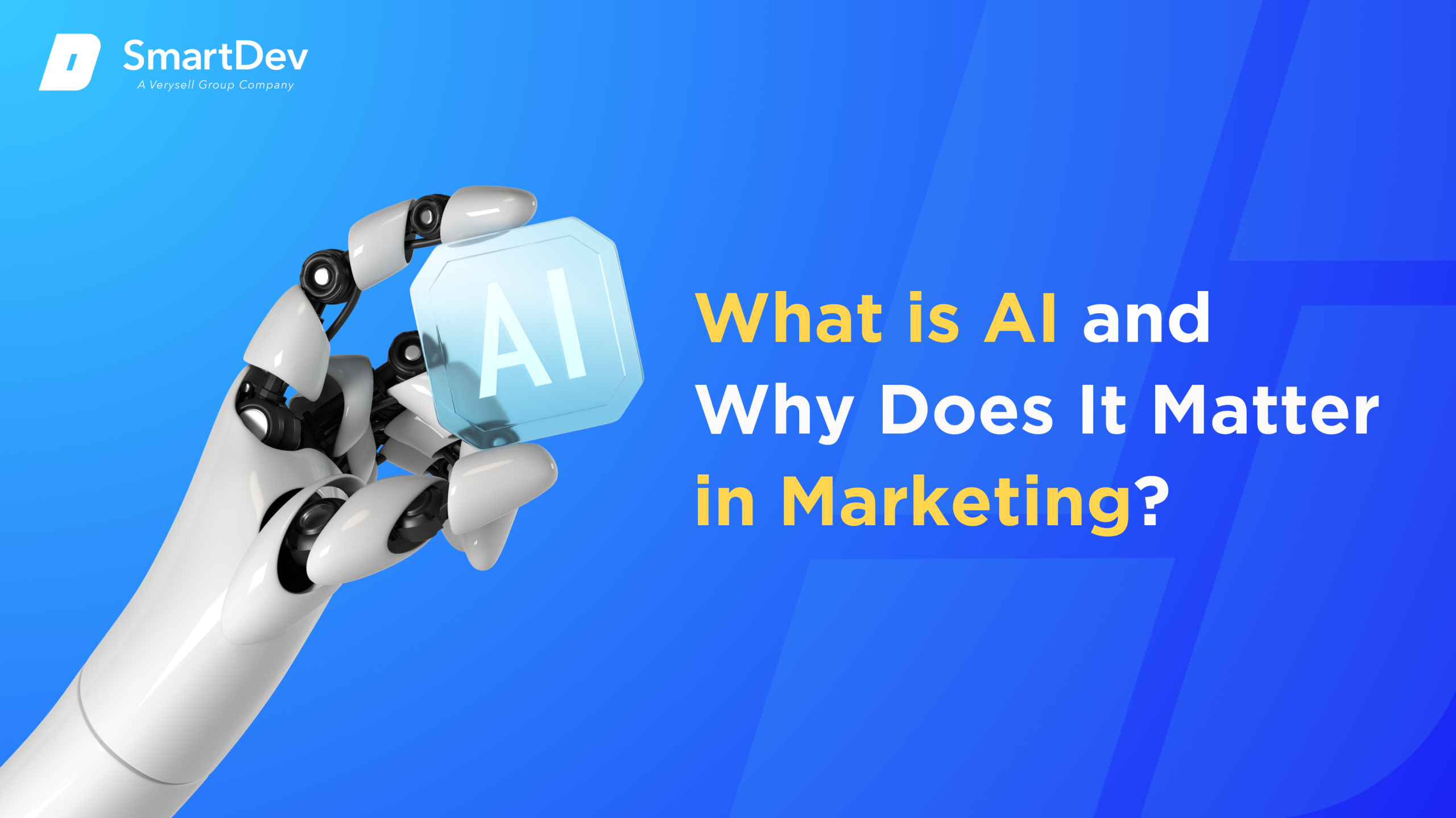 Artificial Intelligence (AI) refers to the simulation of human intelligence in machines that are programmed to mimic human cognitive abilities, enabling machines to analyze data, recognize patterns, and make informed decisions. At its core, AI encompasses Machine Learning (ML), which allows systems to improve with experience; Natural Language Processing (NLP), which enables computers to understand and generate human language; and Computer Vision, which interprets visual data to enhance automation and analytics.
Artificial Intelligence (AI) refers to the simulation of human intelligence in machines that are programmed to mimic human cognitive abilities, enabling machines to analyze data, recognize patterns, and make informed decisions. At its core, AI encompasses Machine Learning (ML), which allows systems to improve with experience; Natural Language Processing (NLP), which enables computers to understand and generate human language; and Computer Vision, which interprets visual data to enhance automation and analytics.
In marketing, AI plays a transformative role by enabling businesses to leverage data and insights in ways that were previously unimaginable. It empowers marketers to predict customer behavior, personalize experiences, and automate processes, all while optimizing campaign performance.
As AI adoption accelerates, marketing teams are increasingly equipped to unlock new levels of innovation and efficiency. By leveraging predictive analytics and automation, AI becomes a critical tool for enhancing customer engagement, optimizing campaigns, and driving measurable results. In today’s competitive landscape, AI is not just a trend but an essential strategy for staying ahead and achieving long-term success in the marketing industry.
The Growing Role of AI in Marketing
The role of AI in marketing has significantly expanded in recent years, reshaping how businesses engage with customers and optimize campaigns. As AI technologies evolve, marketers are now able to leverage powerful tools such as machine learning, predictive analytics, and natural language processing. These advancements allow businesses to gain a deeper understanding of customer preferences, predict trends, and deliver personalized experiences at scale, ultimately leading to more meaningful interactions and improved conversion rates.
Beyond enhancing customer engagement, AI is also streamlining time-consuming marketing tasks like content creation, customer segmentation, and data analysis. Automation of these processes allows marketing teams to shift focus from routine tasks to more strategic initiatives.
With AI, marketers can make smarter, data-driven decisions that improve efficiency and foster deeper connections with audiences. This ability to optimize campaigns and provide personalized experiences not only boosts overall performance but also allows businesses to connect more effectively with customers. As AI adoption increases, its role in marketing will become even more integral, helping businesses stay competitive, refine their operations, and adapt to the rapidly evolving digital environment.
Key Statistics and Trends Highlighting AI Adoption in Marketing
- Market Growth: The AI marketing industry is projected to be valued at approximately $47.32 billion in 2025, a significant increase from $12.05 billion in 2020. Furthermore, it is expected to reach over $107.5 billion by 2028, reflecting a compound annual growth rate (CAGR) of 36.6% from 2024 to 2030
- Widespread Adoption: Digital marketers are currently utilizing AI in their marketing stack. From predictive analytics to customer segmentation and chatbots, AI tools are now embedded across various marketing functions.
- Automation and Efficiency: AI is increasingly being used to automate repetitive marketing tasks, allowing marketers to focus on more strategic initiatives.
- Customer Insights and Personalization: AI tools are instrumental in analyzing customer data to predict behaviors and preferences. Many marketers use AI for research purposes, enabling them to gain valuable insights into market trends and customer needs.
Business Benefits of AI in Marketing
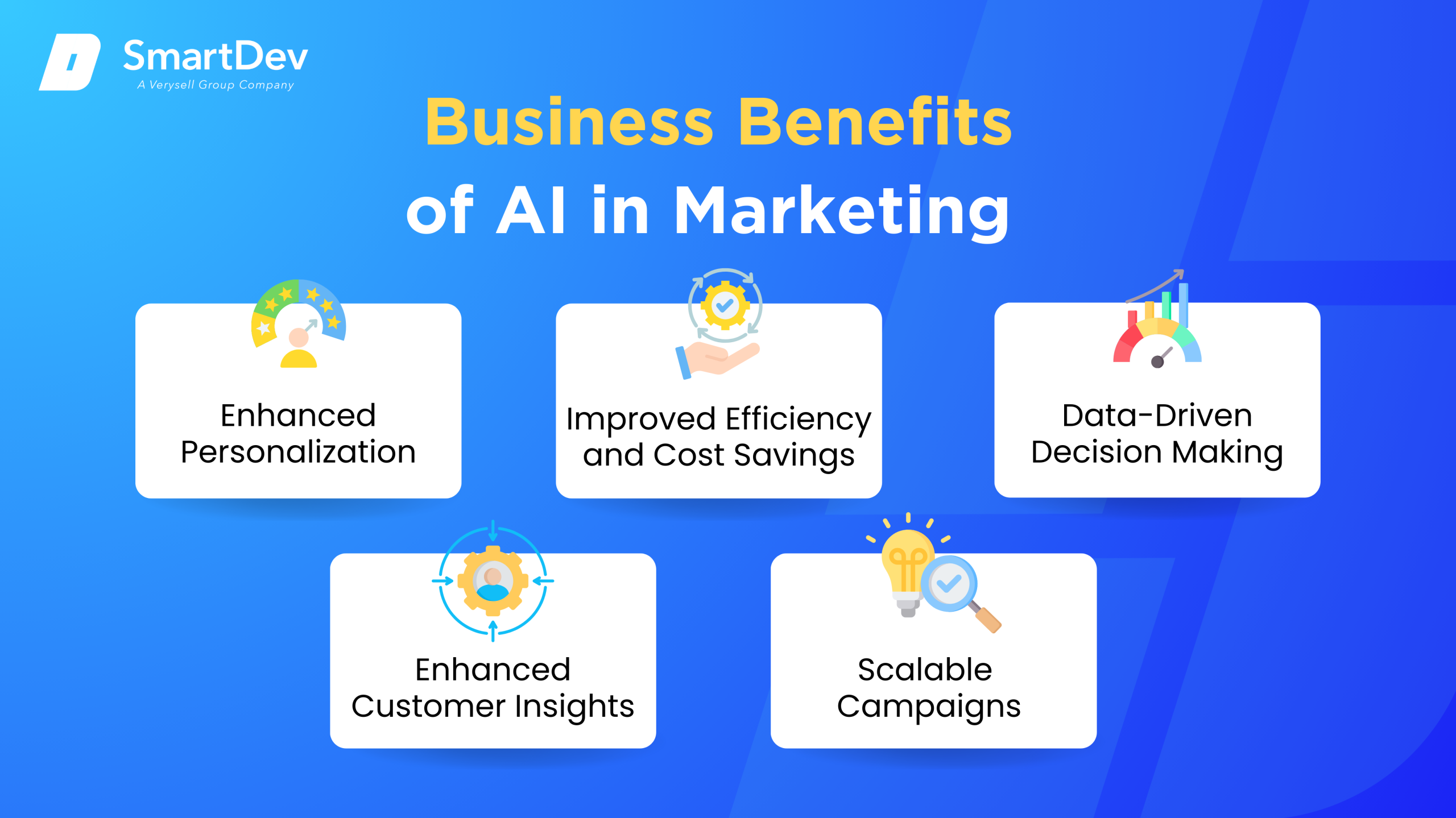
1. Enhanced Personalization
AI has revolutionized the way businesses deliver personalized experiences by leveraging vast amounts of customer data. By analyzing individual behaviors and predicting preferences, AI allows marketers to tailor content, offers, and recommendations to each customer. This level of personalization enhances engagement, increases customer satisfaction, and drives conversion rates, ultimately leading to higher sales and stronger customer loyalty.
2. Improved Efficiency and Cost Savings
One of AI’s most valuable contributions is its ability to automate time-consuming tasks, such as data analysis, customer segmentation, and content creation. By taking over these repetitive processes, AI enables marketing teams to focus on more strategic and creative initiatives. This automation not only boosts productivity but also reduces operational costs, helping businesses achieve more with fewer resources while optimizing their workflows for better efficiency.
3. Data-Driven Decision Making
With AI, marketers can make smarter, data-driven decisions by analyzing real-time data, customer behaviors, market trends, and campaign performance. With this wealth of insights, businesses can identify new opportunities, predict future trends, and adjust strategies accordingly. The ability to make decisions based on accurate, up-to-date information ensures more effective campaigns and maximizes ROI, allowing companies to stay ahead in a competitive market.
4. Enhanced Customer Insights
AI provides deeper, more granular insights into customer behavior by analyzing data across multiple touchpoints, such as social media, email interactions, and website activity. These insights give businesses a comprehensive understanding of their customers, allowing them to predict future behaviors and deliver highly targeted campaigns. With AI, businesses can track the entire customer journey, identify pain points, and optimize marketing efforts to enhance the overall customer experience.
5. Scalable Marketing Campaigns
As businesses grow, scaling marketing campaigns becomes increasingly challenging. AI simplifies this process by automating key tasks like audience segmentation, content generation, and campaign optimization. This scalability allows businesses to manage larger, more complex campaigns efficiently, ensuring they can reach broader audiences without compromising the quality of the customer experience. By automating these processes, businesses can expand their reach, grow their customer base, and drive sustained growth.
Challenges Facing AI Adoption in Marketing
While AI offers significant benefits in marketing, its adoption comes with a set of challenges that businesses must navigate. These obstacles can impact the successful implementation and integration of AI technologies into existing marketing strategies. Addressing these challenges is essential for businesses to fully unlock AI’s potential and drive success in their marketing efforts.
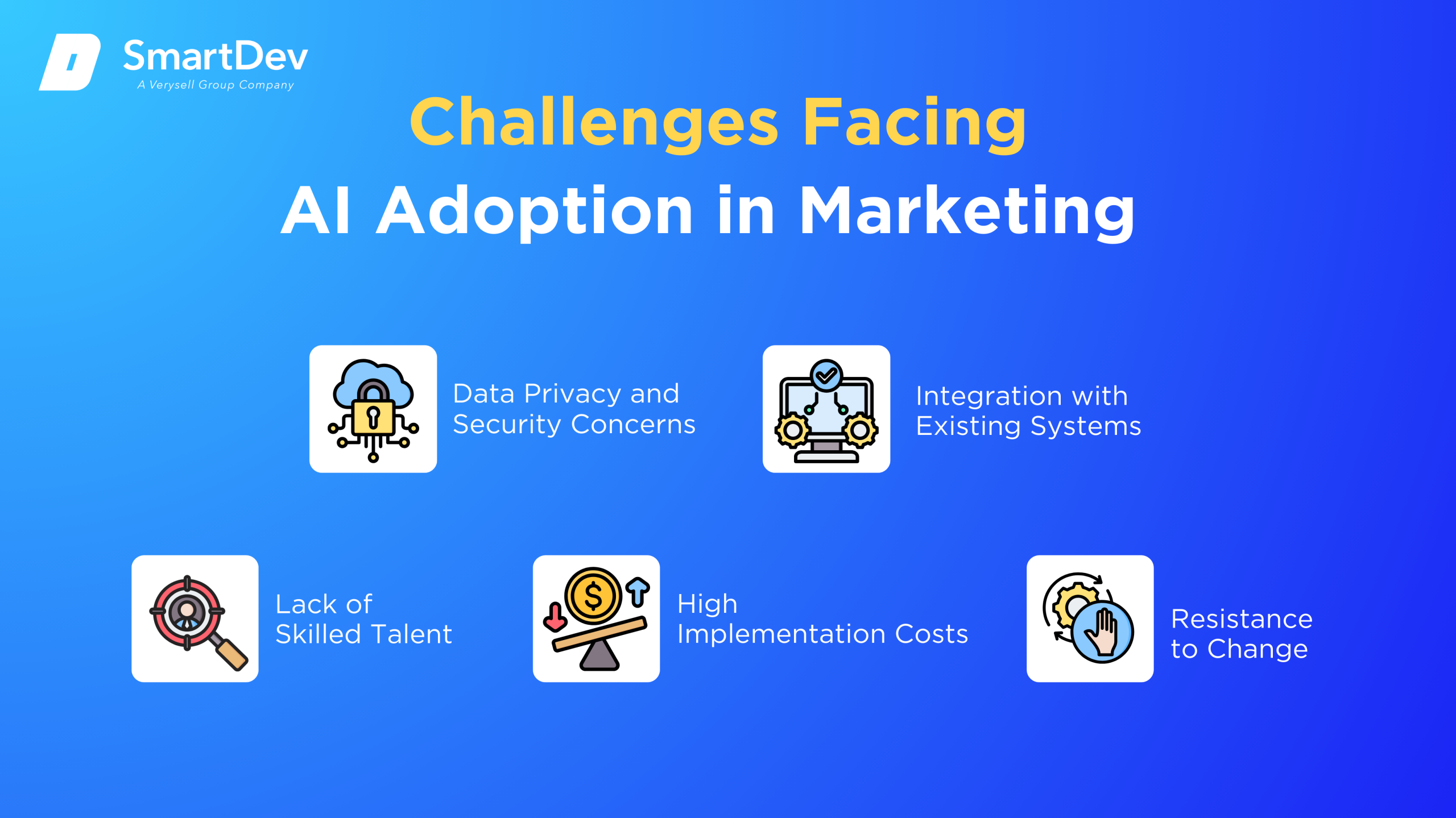
1. Data Privacy and Security Concerns
As AI relies heavily on data to drive insights and personalization, ensuring the security and privacy of customer information becomes a critical challenge. With increasing concerns over data breaches and privacy regulations like GDPR, businesses must navigate complex legal and ethical considerations when implementing AI solutions. Failure to adhere to data protection laws can result in hefty fines, reputational damage, and loss of customer trust, which makes managing data security a significant hurdle for AI adoption in marketing.
2. Integration with Existing Systems
Integrating AI tools into a business’s current marketing infrastructure can be a daunting task. Many businesses already rely on legacy systems and traditional marketing platforms that may not be compatible with advanced AI solutions. This requires significant time, effort, and financial investment to ensure smooth integration and avoid disrupting ongoing campaigns. Companies often struggle with the complexity of aligning new AI technologies with their existing workflows, leading to potential delays and inefficiencies.
3. Lack of Skilled Talent
Implementing AI in marketing requires specialized expertise, and the demand for AI professionals often outpaces supply. Many organizations face challenges in finding or training talent with the necessary skills in machine learning, data science, and AI-driven marketing technologies. This talent shortage can hinder the effective adoption and deployment of AI, as marketing teams may lack the knowledge required to leverage AI tools effectively or fail to understand how to make the most of these technologies.
4. High Implementation Costs
Despite the long-term benefits, the initial costs of implementing AI can be a significant barrier for many businesses. AI technologies often require substantial investment in software, hardware, and infrastructure. Smaller companies or those with limited budgets may find it difficult to justify the upfront costs, especially when AI’s return on investment is not immediately evident. This financial burden can delay or prevent the adoption of AI, particularly for businesses looking for cost-effective solutions.
5. Resistance to Change
Many organizations experience resistance to AI adoption due to a fear of job displacement, unfamiliarity with new technologies, or a lack of understanding of AI’s benefits. Marketing teams that have been accustomed to traditional methods may hesitate to embrace AI solutions, fearing that automation and machine-driven processes could diminish their role or creativity. Overcoming internal resistance and fostering a culture of innovation is essential for successful AI integration, as businesses need buy-in from their teams to fully realize the potential of AI.
Specific Applications of AI in Marketing
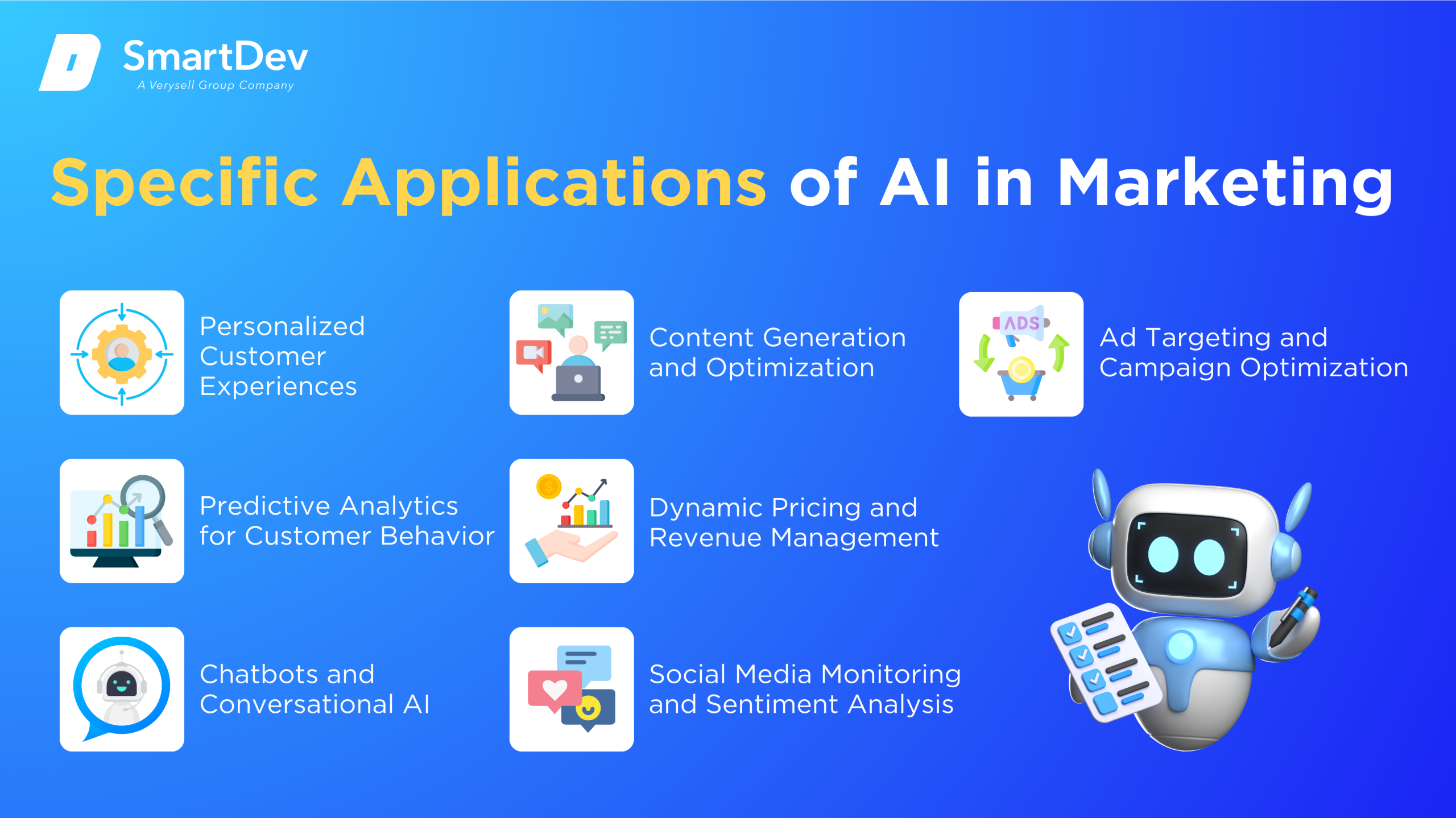
1. Personalized Customer Experiences
Personalized customer experiences have become a cornerstone of successful marketing strategies, and AI is playing a critical role in making this possible. By analyzing vast amounts of customer data, AI can understand individual preferences, behaviors, and purchasing patterns, allowing businesses to deliver tailored content, product recommendations, and offers. This level of personalization goes beyond simple segmentation and helps create experiences that resonate deeply with customers, driving engagement and improving conversion rates.
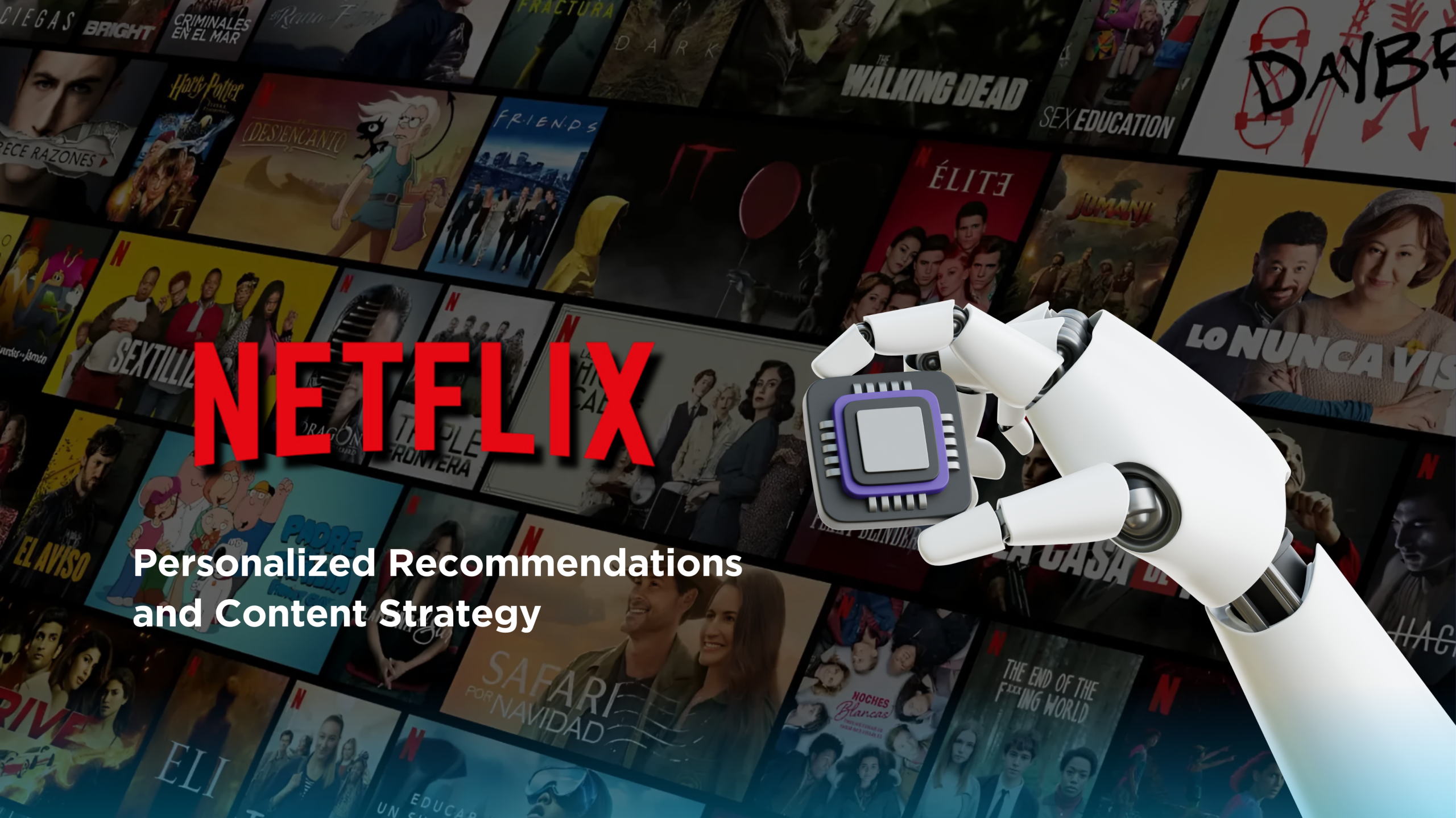 A prime example of AI-driven personalization is Netflix’s recommendation system, which uses sophisticated machine learning algorithms to analyze users’ watch history, search behavior, time spent on certain genres, and even viewing habits across different devices. Based on these insights, Netflix curates customized content suggestions that are unique to each viewer. It’s estimated that over 80% of the content watched on Netflix is driven by its recommendation engine, highlighting AI’s impact on engagement and retention.
A prime example of AI-driven personalization is Netflix’s recommendation system, which uses sophisticated machine learning algorithms to analyze users’ watch history, search behavior, time spent on certain genres, and even viewing habits across different devices. Based on these insights, Netflix curates customized content suggestions that are unique to each viewer. It’s estimated that over 80% of the content watched on Netflix is driven by its recommendation engine, highlighting AI’s impact on engagement and retention.
AI also allows businesses to personalize customer interactions in real time. For instance, AI-powered chatbots and virtual assistants can engage customers in personalized conversations, offering product recommendations, answering queries, or even guiding them through the purchasing process. These interactions are highly tailored to each customer’s preferences, making the experience more relevant and enjoyable.
Moreover, AI’s ability to predict future behavior further enhances personalization. By analyzing customer data, AI can anticipate what customers are likely to want next, enabling businesses to deliver highly relevant offers before the customer even expresses a need. This predictive power ensures that customers are always presented with the most pertinent information, increasing the likelihood of conversion and fostering a more seamless and engaging customer journey.
2. Predictive Analytics for Customer Behavior
Predictive analytics powered by AI allows marketers to anticipate customer behavior by analyzing historical data and identifying patterns. This capability enables businesses to forecast actions such as purchases, churn, or engagement, allowing them to proactively adjust their marketing strategies. By leveraging predictive models, companies can target the right customers at the right time with the right message, improving the efficiency and effectiveness of their campaigns.
In addition to enhancing customer experience, predictive analytics helps businesses optimize marketing spend. This precision not only boosts conversion rates but also helps companies allocate marketing budgets more efficiently, ensuring that resources are spent on high-potential opportunities rather than broad, untargeted campaigns.
Predictive analytics also plays a critical role in customer retention by identifying potential churn before it happens. By analyzing engagement patterns and behaviors, AI can flag customers who show signs of disengagement, allowing businesses to intervene with targeted retention strategies. This capability is essential for companies that want to maintain long-term customer loyalty and reduce churn rates, as it enables them to act before a customer decides to leave.
3. Chatbots and Conversational AI
Chatbots and conversational AI are revolutionizing customer interactions by providing immediate, personalized responses. Leveraging natural language processing (NLP), these AI tools handle inquiries in real time, offering 24/7 support and reducing operational costs. By automating customer service, businesses can enhance customer satisfaction through quicker response times, improving overall efficiency without sacrificing quality.
A prime example of successful chatbot use is H&M’s “Ada,” which assists customers with product recommendations, size guidance, and store locators. This AI-driven tool manages thousands of customer interactions daily, allowing H&M’s customer service team to focus on more complex issues. This reduces workload and provides faster, more accurate responses, improving both operational efficiency and customer satisfaction.
Chatbots also play a key role in boosting sales and lead generation. Sephora’s “Sephora Virtual Artist” chatbot allows customers to try on makeup virtually and receive personalized product suggestions. This interactive experience engages customers and drives purchases, as the chatbot provides immediate, tailored assistance. This leads to increased conversions and customer engagement, demonstrating how conversational AI can directly impact revenue.
Beyond sales, chatbots improve customer retention by offering continuous, personalized engagement. They remember past interactions and make targeted recommendations based on previous purchases, fostering customer loyalty. As AI chatbots continue to evolve, their ability to provide even more personalized and complex interactions will make them an increasingly vital tool for businesses looking to enhance both customer experience and operational efficiency.
4. Content Generation and Optimization
AI is transforming content creation by automating the production of relevant, engaging materials for marketing campaigns. AI tools analyze customer data, trends, and competitor content to generate blog posts, social media updates, and more. This allows businesses to produce high-quality, personalized content at scale while saving time for strategic and creative work.
 Platforms like Copy.ai have successfully helped businesses generate marketing copy, such as product descriptions, email subject lines, and social media posts, in seconds. According to Copy.ai, companies that use these AI tools report significant time savings and higher productivity. By automating content creation, businesses can maintain consistency across channels without sacrificing quality or personalization.
Platforms like Copy.ai have successfully helped businesses generate marketing copy, such as product descriptions, email subject lines, and social media posts, in seconds. According to Copy.ai, companies that use these AI tools report significant time savings and higher productivity. By automating content creation, businesses can maintain consistency across channels without sacrificing quality or personalization.
AI is also crucial for optimizing content for SEO. Tools like Clearscope and SurferSEO analyze keyword trends and user behavior to recommend optimizations for better search rankings. Businesses leveraging these AI-driven platforms see higher organic traffic and improved search visibility, which leads to greater customer acquisition and increased brand presence.
AI also continuously refines content by analyzing its performance and suggesting improvements. This ensures content remains effective, targeted, and aligned with audience interests, maximizing its impact.
5. Dynamic Pricing and Revenue Management
AI-driven dynamic pricing allows businesses to adjust prices in real time based on demand, competition, and customer behavior. By analyzing large datasets, including sales trends, competitor prices, and market conditions, AI optimizes pricing strategies to maximize revenue. This approach enables businesses to remain competitive, improve customer satisfaction, and respond swiftly to changing market conditions.
Uber is a prime example of dynamic pricing in action, using AI for “surge pricing” during high-demand periods. The platform adjusts fares based on factors such as traffic, demand, and time of day, ensuring more drivers are available during peak times. This helps Uber balance supply and demand while maximizing revenue and maintaining customer satisfaction.
Amazon also uses AI to optimize dynamic pricing, adjusting the prices of millions of products based on competition, customer demand, and inventory levels. Prices are updated in real time, sometimes as frequently as every 10 minutes, to stay competitive and maximize sales and profit margins. This ability to constantly fine-tune pricing gives Amazon an edge in the highly competitive e-commerce market.
In industries like airlines, AI-based revenue management predicts demand by analyzing historical data, booking trends, and external factors like weather. This allows airlines to adjust prices dynamically, optimizing seat occupancy and maximizing revenue per flight. AI ensures businesses in various sectors can fine-tune their pricing strategies, boosting profitability by responding quickly to demand fluctuations.
6. Social Media Monitoring and Sentiment Analysis
AI-powered social media monitoring and sentiment analysis provide businesses with real-time insights into customer sentiment and public perception. By analyzing data from platforms like Twitter, Facebook, and Instagram, AI tracks brand mentions, customer feedback, and trending topics. This allows businesses to quickly adapt their marketing strategies, address concerns, and leverage positive sentiment for growth.
Coca-Cola uses AI tools to track social media conversations and assess sentiment around their campaigns. By analyzing brand mentions, Coca-Cola can detect potential issues, such as negative reactions, and respond proactively. This helps them manage public relations effectively and maintain customer loyalty, preventing small concerns from becoming major crises.
AI also helps brands identify emerging trends and customer preferences. For example, Nike uses AI to analyze social media conversations about their products, revealing patterns and insights that inform product development and marketing strategies. This ability to respond quickly to customer feedback enables brands to stay competitive and ensure their products align with consumer expectations.
Furthermore, AI-driven sentiment analysis allows businesses to monitor competitor activity and customer reactions to their campaigns. By tracking competitor sentiment, companies can spot areas where they can improve or differentiate themselves. This insight helps businesses adjust their strategies to better meet customer needs and outperform their competitors.
7. Ad Targeting and Campaign Optimization
AI-powered ad targeting and campaign optimization are transforming digital advertising by enabling businesses to reach the right audience with highly relevant ads. Through data analysis and machine learning, AI predicts customer behavior, segments audiences, and tailors messaging, leading to higher engagement and conversion rates.
Facebook Ads is a prime example of AI-driven ad targeting. The platform uses machine learning to optimize ad placements by analyzing user behavior and engagement patterns. This allows businesses to target the most relevant audience, resulting in up to 3x higher conversion rates compared to traditional advertising. AI’s ability to continuously adjust campaigns in real time ensures maximum effectiveness.
AI also aids in continuous campaign optimization. Google Ads, for instance, uses AI to test different ad variations and adjust bidding strategies automatically. This process helps marketers save time while maximizing ROI, as AI identifies high-performing ads and allocates budgets accordingly. Companies utilizing AI in Google Ads have reported up to a 30% reduction in cost-per-acquisition (CPA), showing the effectiveness of automated optimization.
Furthermore, AI can help identify new, high-value audience segments. By analyzing user behavior across various touchpoints, AI uncovers previously overlooked groups that are more likely to convert. This deeper insight allows businesses to refine targeting strategies, expand their reach, and improve the overall success of their campaigns.
These use cases highlight the practical ways AI is being applied across marketing functions to enhance performance and streamline operations. By embedding intelligence into everyday processes, businesses can make faster decisions, deliver more value, and adapt more effectively to evolving customer needs.
Real-World Case Studies of AI Driving Change in Marketing
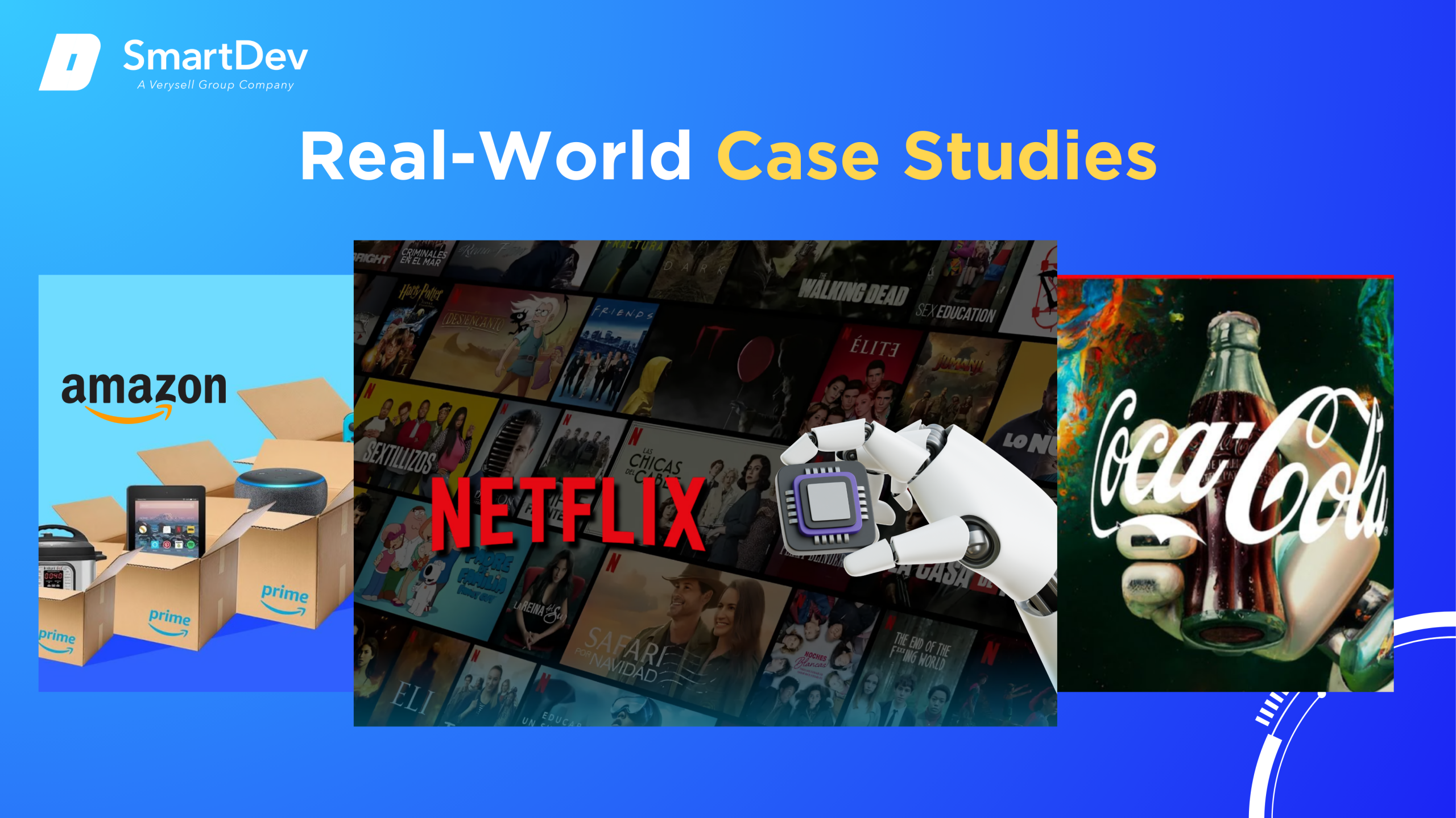
1. Netflix: Personalized Recommendations and Content Strategy
Netflix uses AI to personalize its content recommendations, tailoring suggestions based on viewing history, preferences, and demographic data. This AI-driven approach enhances user engagement, keeping subscribers active by offering them relevant content that matches their interests. As a result, over 75% of content consumed on Netflix comes directly from its recommendation engine, which improves retention and keeps users engaged longer.
By continuously refining its algorithms, Netflix not only boosts user satisfaction but also reduces churn. Subscribers who receive tailored recommendations are more likely to stay, resulting in lower cancellation rates and higher customer lifetime value. This strategy has played a significant role in Netflix’s ability to retain a competitive edge in the crowded streaming industry.
2. Amazon: Dynamic Pricing and Personalized Shopping Experience
Amazon’s AI-driven dynamic pricing adjusts product prices based on demand, competition, and inventory levels. This real-time price optimization ensures that Amazon remains competitive while maximizing revenue across its vast catalog. AI also personalizes the shopping experience, offering tailored product recommendations that drive higher sales volumes and increase average order value.
The AI-powered recommendation engine accounts for 35% of Amazon’s total revenue, highlighting its effectiveness in boosting sales. By automating pricing and providing personalized shopping experiences, Amazon ensures it meets customer expectations while optimizing profitability, making its platform more attractive to both consumers and sellers.
3. Coca-Cola: AI-Driven Customer Insights and Campaign Optimization
Coca-Cola uses AI to monitor social media sentiment and brand mentions, enabling real-time tracking of consumer reactions to its marketing campaigns. This allows the company to quickly adjust its strategies, responding to customer feedback and enhancing brand engagement. AI tools like IBM Watson help Coca-Cola stay ahead of potential issues, ensuring that their messaging resonates with consumers and fosters positive sentiment.
By leveraging AI for campaign optimization, Coca-Cola has been able to increase the effectiveness of its marketing efforts. Quick adjustments based on AI insights improve customer engagement, which in turn drives higher sales and brand loyalty.
Innovative AI Solutions
AI is continually evolving, bringing new and innovative solutions that are reshaping how businesses approach marketing. Emerging technologies such as natural language processing (NLP), machine learning (ML), and computer vision are enabling more advanced and effective strategies. These technologies aren’t just enhancing marketing but they’re transforming how brands grow.
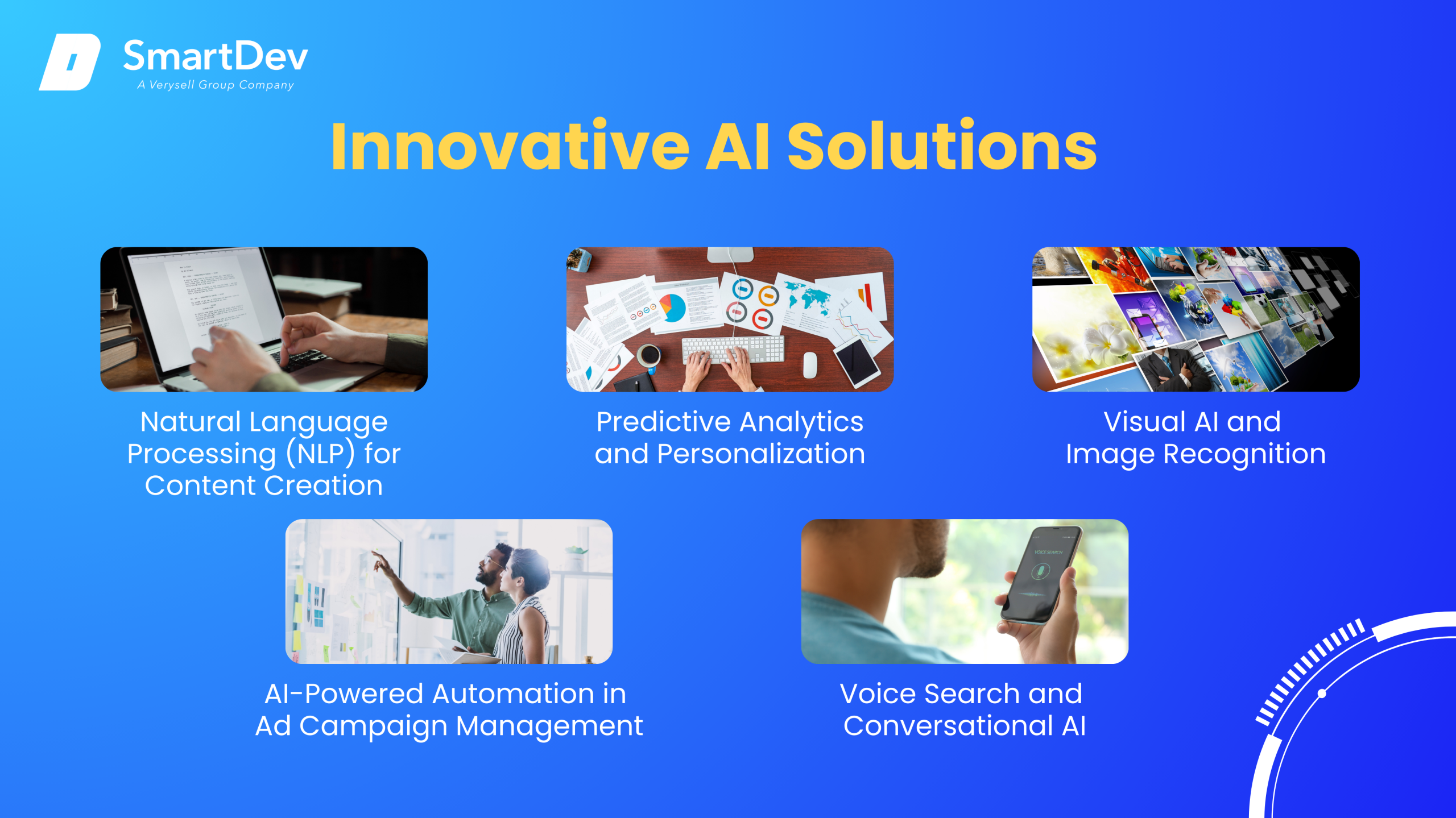
- Natural Language Processing (NLP) for Content Creation: AI-driven NLP tools automate content generation, such as product descriptions, social media posts, and customer interactions, improving efficiency and delivering personalized messaging at scale.
- Predictive Analytics and Personalization: AI uses predictive models to forecast customer behavior, optimize targeting, and tailor campaigns, resulting in hyper-targeted marketing, higher conversion rates, and improved ROI by offering personalized recommendations.
- Visual AI and Image Recognition: AI-powered image recognition allows businesses to analyze and categorize visual content, enabling personalized ads, product identification from user-generated content, and more dynamic pricing strategies based on customer behavior.
- AI-Powered Automation in Ad Campaign Management: AI automates the optimization of ad bidding, targeting, and creative strategies in platforms like Google Ads and Facebook Ads, ensuring real-time campaign refinement and more efficient budget allocation.
- Voice Search and Conversational AI: With the rise of voice-activated devices, AI-powered voice search and conversational AI enhance customer interactions, optimize content for voice search, and improve personalized, seamless experiences through chatbots and virtual assistants.
Transforming Marketing: The Impact of AI-Driven Innovations
Emerging Technologies in AI for Marketing
- Generative AI Applications: Generative AI is transforming content creation by allowing AI models to produce original content such as blog posts, ad copy, and social media updates. Tools like OpenAI’s GPT help marketers quickly generate personalized content at scale, boosting efficiency and campaign effectiveness. This enables businesses to automate tailored messaging for different customer segments, increasing engagement and driving better results.
- Computer Vision for Visual Data Analysis: Computer vision is helping brands analyze visual content, such as images and videos, to gain insights into customer behavior. This technology tracks interactions with visuals, identifies trends in user-generated content, and optimizes ad targeting. By personalizing visuals based on customer preferences, computer vision enhances engagement and ensures more relevant and impactful marketing campaigns.
AI’s Role in Sustainability Efforts
- Reducing Waste through Smarter Forecasting: AI-powered predictive analytics helps marketers plan smarter by accurately forecasting customer demand. This means producing only what’s needed whether that’s promotional materials, product packaging, or campaign assets, which helps cutting down on excess and minimizing waste.
- Optimizing Energy Consumption through Automation: Smart systems powered by AI can automatically adjust lighting, digital displays, and climate controls based on real-time data like traffic flow or time of day. This kind of intelligent automation helps reduce energy consumption without sacrificing performance or customer experience.
- Supporting Eco-Conscious Branding: Leveraging AI for sustainability demonstrates a brand’s commitment to responsible practices. Marketing efforts that reflect environmentally aware operations help strengthen consumer trust and resonate with audiences that prioritize sustainability.
How to Implement AI in Marketing
Implementing AI in marketing offers a powerful opportunity to enhance strategies, boost operational efficiency, and deliver highly personalized customer experiences. To maximize its potential and ensure seamless integration, it’s essential to approach AI adoption strategically. This step-by-step guide will help businesses effectively integrate AI into their marketing strategies, driving better results and staying competitive.
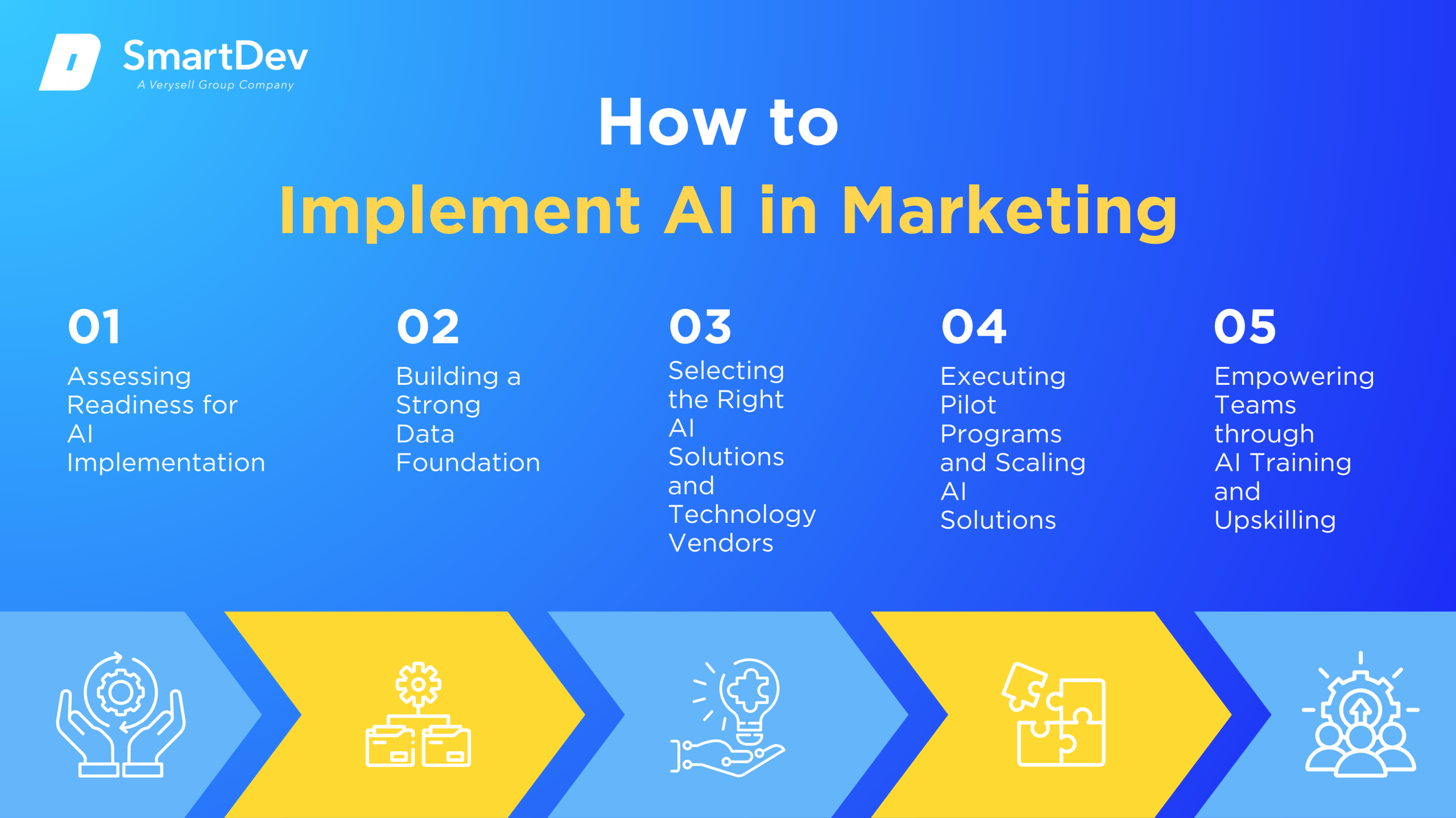 Step 1. Assessing Readiness for AI Implementation
Step 1. Assessing Readiness for AI Implementation
Before diving into AI, assess your organization’s readiness by evaluating current workflows, technologies, and team capabilities. Consider factors like the quality of your data, the infrastructure needed for AI tools, and the commitment from leadership to adopt AI. Conducting a readiness assessment will help you identify any gaps or challenges, allowing you to plan for a smooth transition and prioritize key areas where AI can add the most value.
Step 2. Building a Strong Data Foundation
AI relies heavily on high-quality data, making it crucial to build a robust data foundation. This involves gathering, cleaning, and organizing data from various sources such as customer interactions, sales history, and social media analytics. A centralized data warehouse can help consolidate this information for easy access and analysis.
Step 3. Selecting the Right AI Solutions and Technology Vendors
Once you have a solid data foundation, the next step is selecting the right AI tools and technology vendors. Depending on your marketing goals, you may need AI solutions for personalization, predictive analytics, customer segmentation, or campaign optimization. Evaluate AI vendors based on their expertise, platform scalability, and the support they offer. Make sure the solution you choose integrates well with your existing tools and infrastructure for seamless operations.
Step 4. Executing Pilot Programs and Scaling AI Solutions
Start with a small-scale pilot program to test your chosen AI solutions and assess their performance in a real-world environment. Monitor key performance indicators (KPIs) such as engagement rates, conversion rates, and ROI to determine the effectiveness of the AI tools. Based on the results, refine your strategy and scale the AI solutions to other areas of your marketing efforts.
Step 5. Empowering Teams through AI Training and Upskilling
For AI to succeed in your marketing efforts, it’s essential to empower your team with the necessary skills and knowledge. Invest in AI training and upskilling to help your marketing team understand how to leverage AI tools effectively. A well-trained team will ensure that AI is used to its full potential, driving more successful campaigns and improving overall performance.
By following these steps, you’ll be well on your way to harnessing the full potential of AI in your marketing efforts. With the right tools, a clear strategy, and a focus on ongoing development, AI can revolutionize your approach, streamline operations, and deliver exceptional customer experiences. Embrace the power of AI to stay ahead of the curve and drive long-term success in a rapidly evolving market.
Assessing the ROI of AI in Marketing
Investing in AI for marketing promises smarter decisions, increased efficiency, and better customer engagement, but how do you know it’s paying off? Assessing the return on investment (ROI) of AI requires a combination of strategic metrics, real-world validation, and a clear understanding of what to watch out for.
Key Metrics to Track Success
- Productivity Improvements: AI can significantly enhance marketing productivity by automating routine tasks. Track how much time is saved through automation, as this directly correlates with higher team efficiency and the ability to focus on more strategic initiatives. Measure the speed of campaign launches and how quickly AI can optimize ads or content based on real-time data.
- Cost Savings Achieved Through Automation: AI reduces operational costs by automating tasks that typically require manual effort. Businesses can lower labor expenses, reduce reliance on external services, and cut campaign execution costs. Tracking these savings helps demonstrate the financial efficiency gained through AI adoption.
- Increased Conversion Rates: AI significantly enhances conversion performance by delivering highly personalized and timely experiences that guide users toward action. From tailored recommendations to dynamic CTAs, AI ensures relevance at every touchpoint. Monitoring conversion rates across touchpoints helps measure how effectively AI is driving users down the funnel.
- Higher Engagement Metrics: AI enhances engagement by tailoring content and timing to individual user preferences. This leads to more opens, clicks, longer site visits, and increased interactions across digital channels. Monitoring metrics like CTR, time on page, and bounce rate can reveal how well your AI-driven campaigns resonate.
Case Studies Demonstrating ROI
Leading brands are achieving impressive results by integrating AI into their marketing strategies. Sephora leverages AI-powered product recommendations and virtual assistants to deliver a seamless, personalized shopping experience, resulting in higher conversion rates and greater customer satisfaction.
Starbucks uses predictive analytics within its mobile app to tailor order suggestions based on individual habits and preferences. This data-driven approach has strengthened customer loyalty and increased repeat sales.
These success stories highlight how AI can translate intelligent insights into tangible marketing outcomes: enhancing performance, efficiency, and long-term value.
Common Pitfalls and How to Avoid Them
- Data Quality Issues: AI models rely heavily on high-quality data, and poor data can lead to inaccurate predictions and suboptimal performance. To avoid this pitfall, ensure that your data is clean, organized, and relevant to your marketing goals. Invest in data management systems that allow for accurate tracking and integration across platforms.
- Overestimating AI’s Capabilities: AI can provide significant benefits, but it’s not a cure-all solution. Sometimes, businesses overestimate what AI can achieve, expecting instant results. To avoid this, set realistic expectations and begin with pilot programs to test AI applications before scaling them across your marketing strategies.
- Neglecting Human Expertise: While AI can automate many tasks, human oversight is still crucial for strategic decision-making and creative direction. Ensure your team is involved in the AI implementation process and continuously provide training to help them leverage AI tools effectively.
The Next Frontier of AI in Marketing: Future Trends and Insights
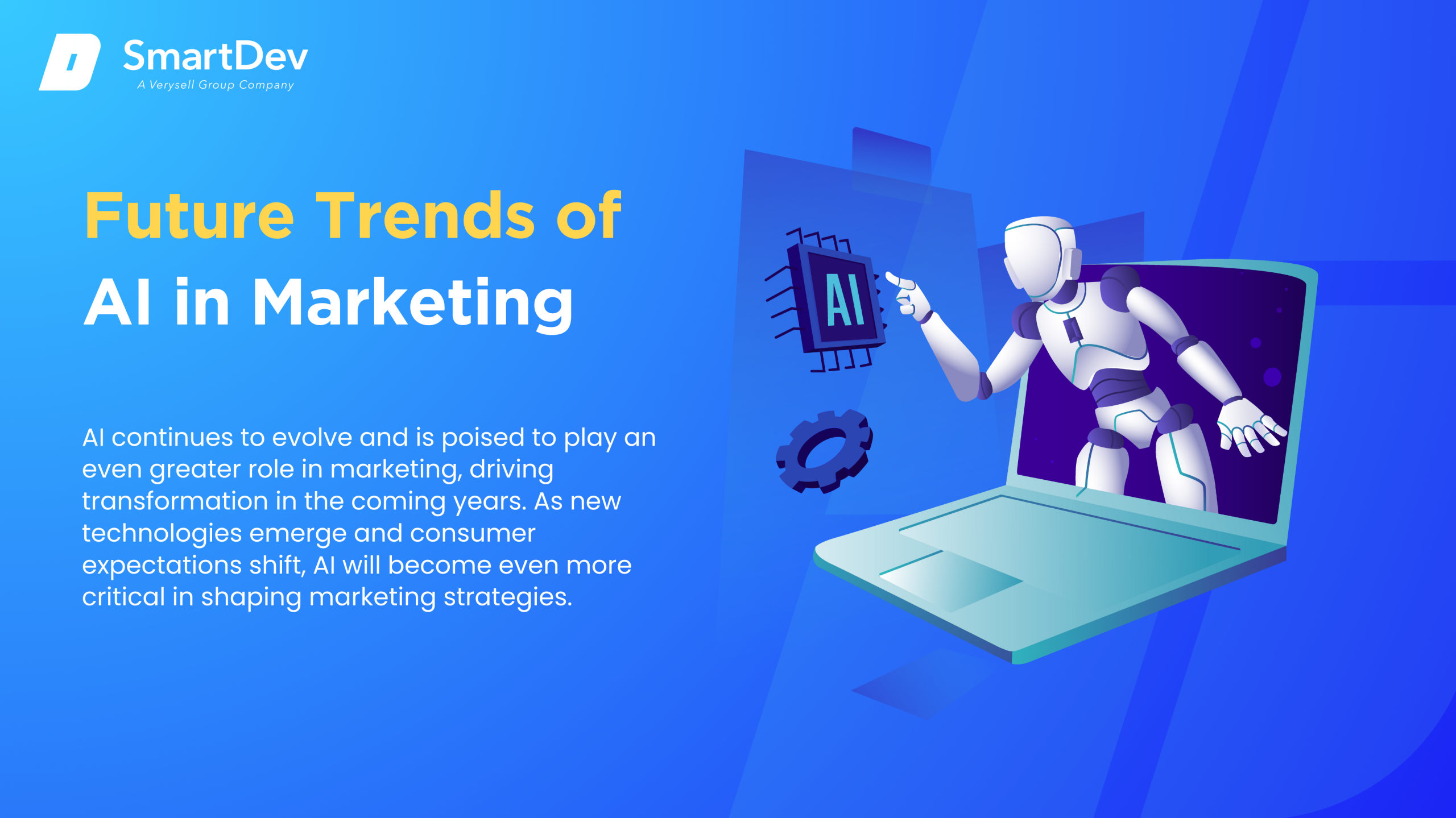
Predictions for the Next Decade
Over the next decade, AI will take personalization to a new level, enabling hyper-targeted marketing at scale. By analyzing real-time data and deeper customer behaviors, AI will help businesses create ultra-personalized content and experiences, ensuring every interaction feels uniquely tailored to each individual. This will not only improve customer engagement but also foster long-term loyalty as brands offer more relevant and timely communications.
Additionally, AI-driven content creation will become more advanced, automating the production of high-quality content across various formats like text, video, and audio. Marketers will increasingly rely on AI to generate creative content at scale, streamlining their content efforts without sacrificing quality. This evolution will empower businesses to maintain a consistent brand presence across multiple platforms while optimizing resource use.
Stay Ahead of the Curve: Key Strategies for Future Success
As AI continues to evolve, staying ahead of the curve is crucial for businesses to maintain a competitive edge. Implementing the right strategies will ensure that your marketing efforts leverage AI’s full potential while driving innovation, efficiency, and customer loyalty.
- Invest in Data Infrastructure: Ensure your data management systems are scalable and capable of handling diverse, real-time data to fuel AI algorithms and drive personalized marketing.
- Focus on Ethical AI Practices: Prioritize transparency and fairness in AI models, ensuring unbiased decision-making and responsible data handling to build trust and long-term loyalty.
- Continuous Upskilling and Training: Keep your team updated on AI advancements through regular training, ensuring they can effectively use AI tools and stay ahead of trends.
- Embrace Multichannel AI Integration: Integrate AI across all marketing channels to provide a seamless, personalized experience that enhances customer engagement and brand loyalty.
Conclusion
AI is transforming marketing from the ground up: making campaigns smarter, more personalized, and data-driven. As adoption accelerates, businesses that strategically implement and scale AI will gain a clear competitive edge. The future of marketing belongs to those who embrace intelligent innovation.
Summary of Key Takeaways
- Define your goals before adopting AI: Identify the specific challenges AI should solve, whether it’s personalizing customer experiences, optimizing ad spend, or streamlining workflows. Clear goals lead to smarter tool selection and measurable outcomes.
- Prioritize data readiness: AI thrives on high-quality, well-structured data. Ensure your marketing data is clean, centralized, and accessible to fuel accurate predictions and meaningful automation.
- Use AI to elevate strategy – not just automate tasks: Beyond efficiency, AI offers the ability to uncover insights, predict customer behavior, and deliver dynamic experiences in real time. Leverage it as a strategic advantage, not just a time-saver.
- Start small, measure, and scale responsibly: Launch pilot programs with clear KPIs. Track metrics like conversion lift, campaign speed, or cost-per-acquisition to assess ROI before expanding AI usage.
- Stay customer-centric and ethical. As AI personalizes and automates more touchpoints, transparency and responsible data use are critical. Focus on building trust through relevant, respectful, and value-driven interactions.
- Continuously evolve with the technology. AI in marketing is rapidly advancing. Stay informed about emerging tools and trends to remain competitive, agile, and ahead of customer expectations.
Moving Forward: A Path to Progress
As AI technology advances, the future of marketing lies in continuous innovation and adaptation. To stay ahead, businesses must invest in solid data infrastructure, embrace ethical AI practices, and empower teams through upskilling and training. Integrating AI across multichannel strategies will further enhance customer experiences and brand loyalty. By adopting these strategies, businesses can harness the full potential of AI to drive growth, improve marketing outcomes, and remain competitive in a rapidly evolving market.
At SmartDev, we specialize in delivering innovative AI solutions that drive growth and efficiency across industries. From AI-powered automation to predictive analytics, our team helps businesses leverage cutting-edge technologies to stay competitive and achieve success.
Contact us today to discover how AI can revolutionize your marketing strategy, enhance customer engagement, and drive measurable success. Let us support you in building a smarter, AI-powered future that sets your brand apart in the dynamic world of marketing.
References
- AI Will Shape the Future of Marketing | Harvard’s Division of Continuing Education
- The Amazing Ways Amazone Is Using AI Robots | Forbes
- The Future of Digital Marketing: Leveraging Artificial Intelligence for Competitive Strategies and Tactics | IGI Global
- Market Value of Artificial Intelligence (AI) in Marketing Worldwide from 2020 to 2028 | Statista







